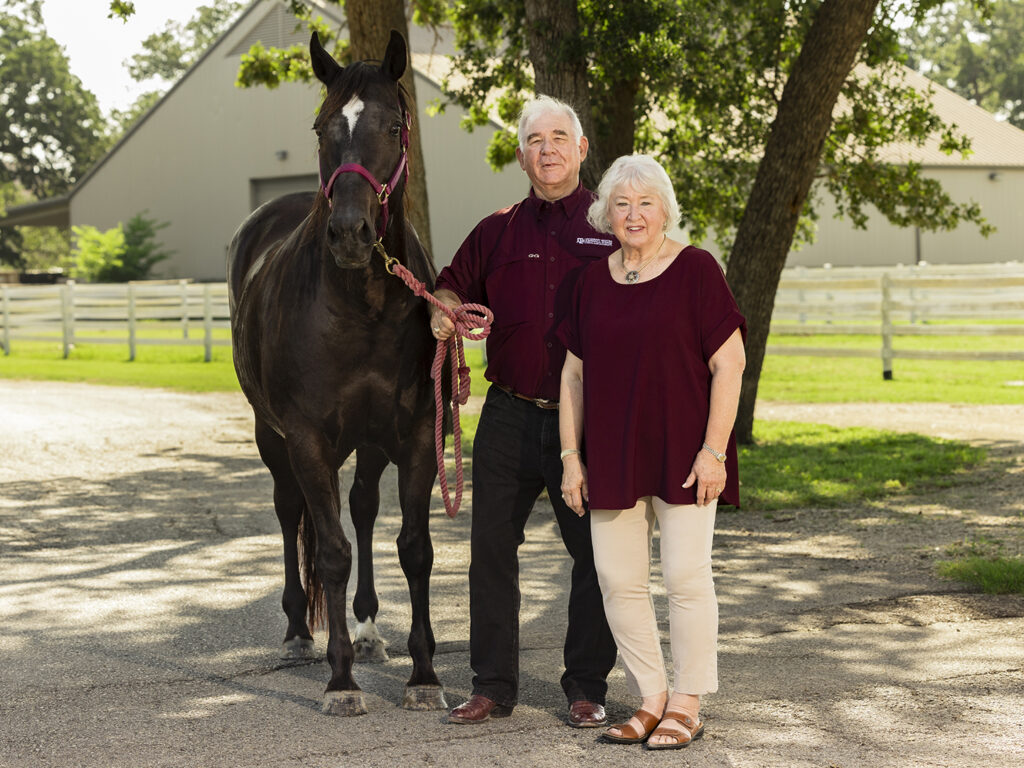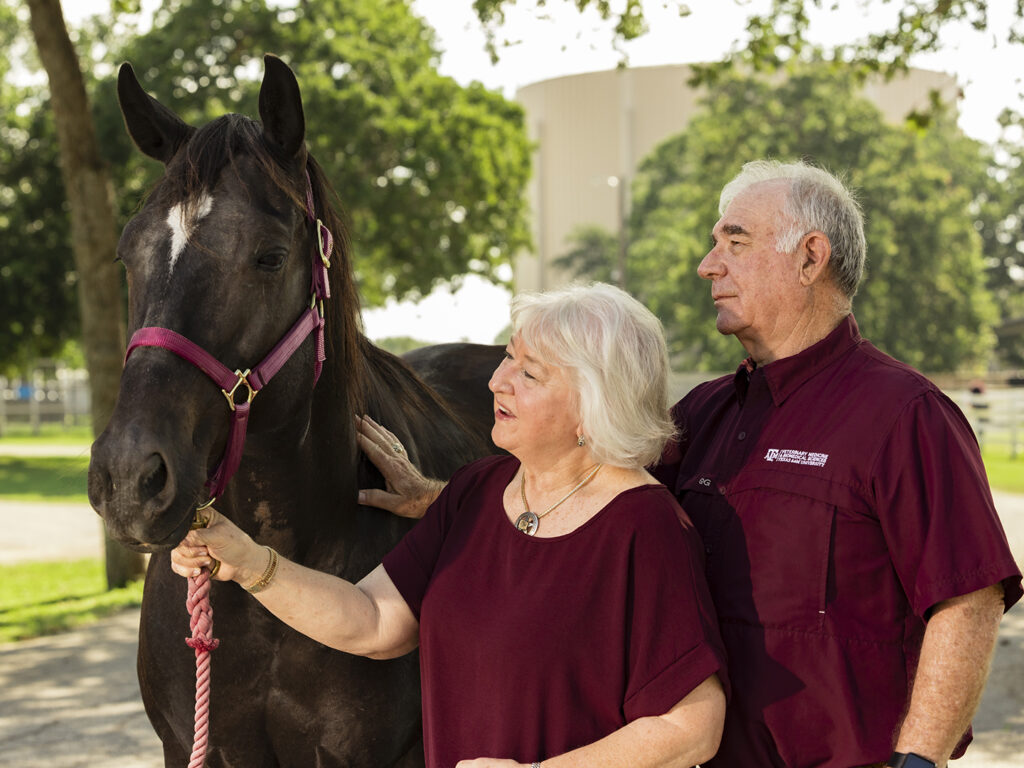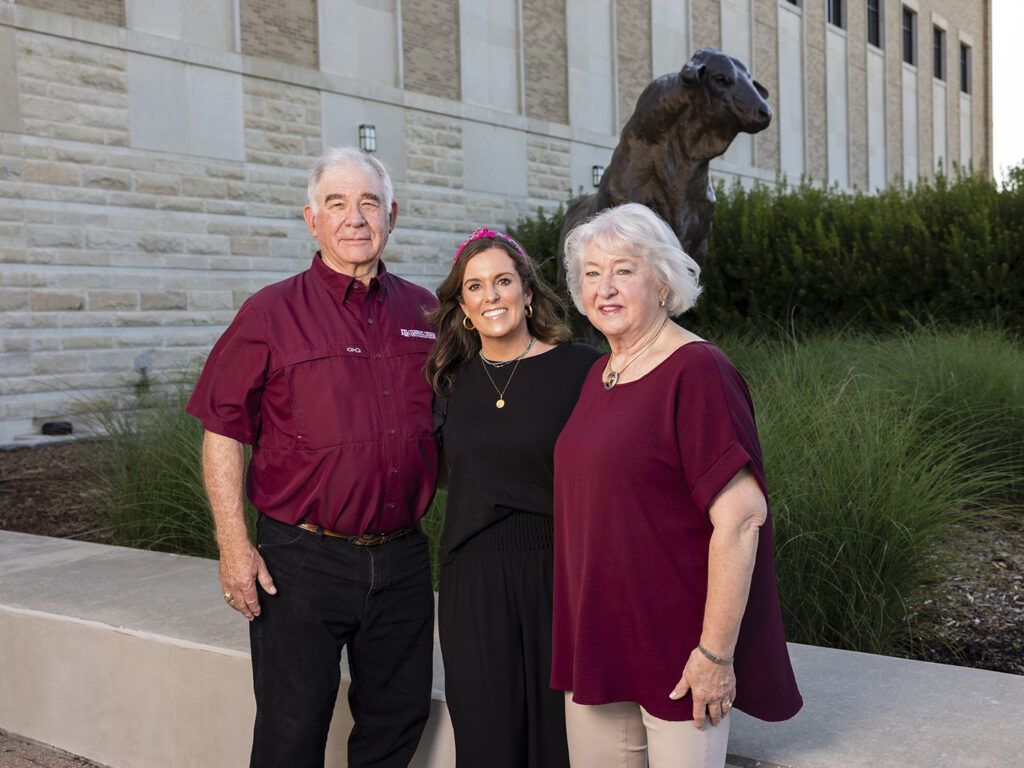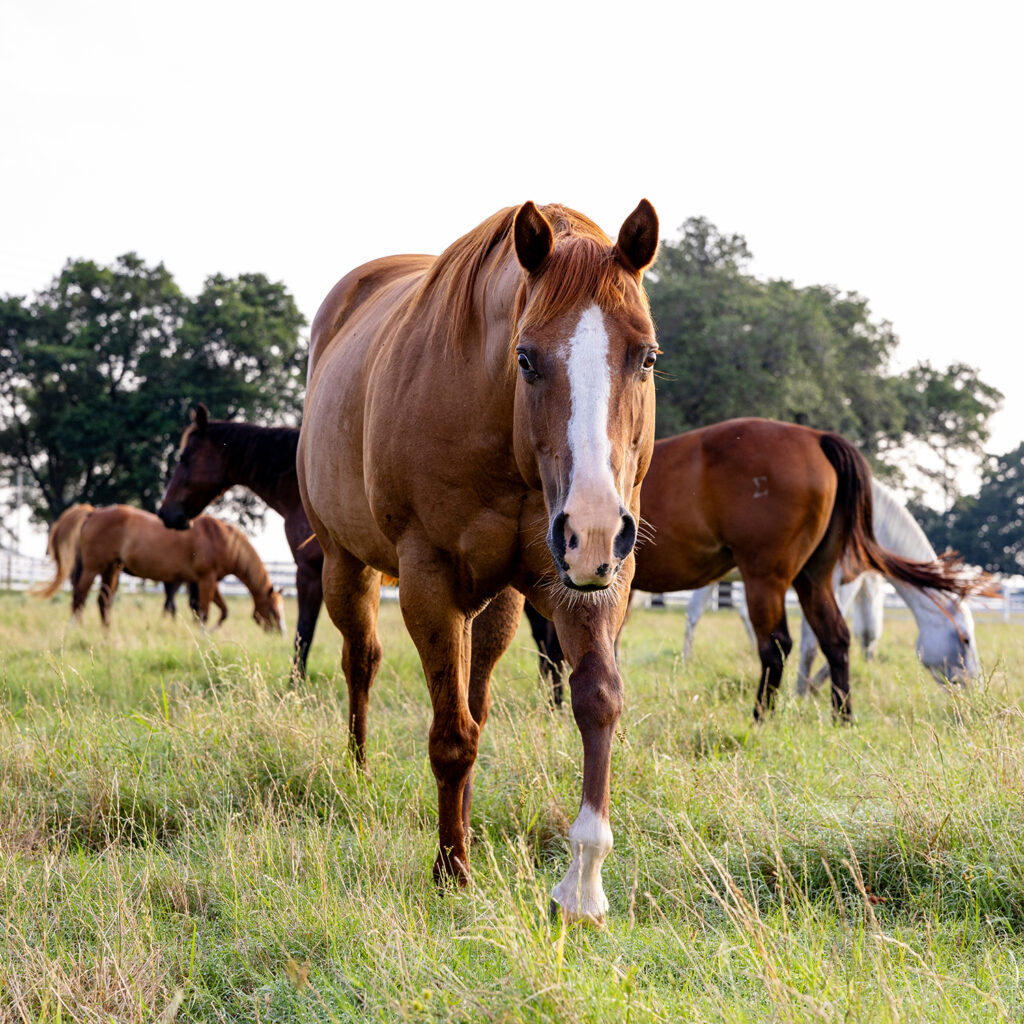Texas A&M Former Students Supporting A New Chapter In VMBS Veterinary Education
Story by Rachel Knight, VMBS Marketing & Communications

Photos by Jason Nitsch ‘14, College of Veterinary Medicine & Biomedical Sciences
Judy D. ‘78 and Tim R. ‘74, ‘77 Turner employ hard work and the Aggie core values daily as they carry on their family’s ranching tradition on a 16,000-acre ranch west of San Angelo, property originally deeded to the Turner family in 1877 — just 34 years after Texas was founded.
Honoring their western heritage at T-Star Ranch, the Turners run 250 Angus-Charolais cross cattle and about 100 Dorper sheep; they also operate a limestone quarry that runs 250 trucks daily and Southwestern Livestock Mineral Company, which makes the livestock equivalent of vitamins for humans.
“We were a little over-educated for the ranch work we were doing when we moved back to the ranch after college, so we started a business and put some of the new skills we’d learned at Texas A&M to work,” Tim said. “The mineral company really complements the ranch work we do and it’s something we enjoy.”
In 2024, the Turners embarked on a new tradition when they made a donation to the Texas A&M College of Veterinary Medicine & Biomedical Sciences (VMBS) to help future Aggie veterinarians in their preclinical years fall in love with the small-town lifestyle they enjoy. Their support provides stipends for 19 first- and second-year veterinary students to join Texas A&M medical students in serving rural communities and experiencing small-town life during a summer program called the Rural Veterinary Practice Preclinical Externship.
“This donation was the chance to do something that is beneficial and meaningful not only to the veterinary profession but also to the individuals and the communities they will go on to serve,” Tim shared. “A lot of young veterinarians coming out of vet school graduate with student debt. They go into private practice in the city thinking it’s the only way to pay off their debt and earn a living. We want to help show them that a mixed animal practice in a rural community can offer the same opportunities and more.”
A Small Town Boy & A City Girl
While Tim was born into the small-town lifestyle — graduating from a school district with a total of 112 students in first through 12th grade — Judy was raised in Houston, where she graduated high school in a senior class of 758.
“He doesn’t understand ‘big school’ dynamics, and I’m still learning about ‘small school’ dynamics,” Judy said.
While their school experiences were vastly different, Tim and Judy both learned the value and importance of community involvement at an early age.
“Where I grew up, if you wanted to see somebody, you went to the Friday night football game because you saw everybody there,” Tim said. “My daddy was a veterinarian, so a lot of times he took his pickup truck to the games. He knew someone would come up and say, ‘Can you go by and check on my heifers on the way home?’
“Going with him showed me the importance of being involved in the community,” he said. “My daddy was on the school board for 19 years, my grandad was on the school board for 12 years, and now, I’ve served on the school board and on the state parent teacher association board.”
Though she grew up over 300 miles southeast in Houston, Judy also developed similar values and a strong work ethic.
“Growing up, my family lived across the street from our church, so I was brought up in a family that volunteered all the time,” Judy shared. “We’re still very active in our community and in our church.”
Two Worlds Collide

The Turners’ worlds collided at Texas A&M University when Judy was an undergraduate and Tim was a Doctor of Veterinary Medicine (DVM) student. While they’re only a year apart in age, their financial circumstances heading into college separated them by several years in school.
“Our dads were both Aggies, and my grandad was also an Aggie,” Judy shared. “But my dad told me I couldn’t be an Aggie, because girls couldn’t go there. While I adored my father, I wanted to prove him wrong.
“I got in and he was shocked,” Judy said. “I paid for most of my college education myself and about the third year, he was so proud of me that he started helping more financially. It didn’t hurt that my older brother had gone to the University of Texas, which made me the beloved child because I was doing well at Texas A&M.”
To support her studies, Judy worked full-time at a medical center in Houston for a full year before beginning classes.
“I kept that job part-time after I started my studies and would go home every holiday — including spring break, summer, and Christmas — to work the maximum number of hours,” she shared. “I also became a resident adviser (RA), which helped to cover some of my living expenses, and I worked at Albertsons, a grocery store within walking distance from campus, on the weekends.”
Tim’s financial situation was a little different, allowing him to start classes sooner at Texas A&M.
“I took two grades in one year in grade school, so I was 17 when I started at Texas A&M,” Tim shared. “I had livestock at home that brought in a little money. Daddy only paid for one semester and then I was able to pay everything else. I also worked as an RA for a year, and then when I started veterinary school, I became a head resident.”
Tim’s early start in college played a critical role in the early development of the Turners’ relationship. They met briefly a few times, but it wasn’t until Judy took animal science classes that they really hit it off.
“He got his first degree in ‘74, and I was just starting in the fall of ‘74,” Judy said. “In my animal science classes, I couldn’t figure out where the cuts of meat that we hear about came from. All I could see were muscles and I had to ask Tim, a more advanced student, where the meat was.”
The Turners became close friends and began dating the summer Tim graduated from vet school. He returned to the family ranch shortly after.
“He looked at me after he graduated and said, ‘My daddy owns an airplane and I will fly down here and take you to all the Texas A&M home football games,” Judy recalled. “I said, ‘sure,’ not really believing him. But his daddy did own an airplane and he did fly down and take me to every home football game. We were engaged by the first of October.”
Judy graduated that May, and a few days after her graduation, the Turners tied the knot. This time, they returned to the ranch together.
Sharing Small Town Life

On the ranch, Judy learned to ride a horse and work cattle, and they both became more active in the local community.
“A lot of my work outside of the ranch and the mineral company has been volunteering,” Judy said. “I was on the executive committee of the Junior League of San Angelo, and I was the wedding director at our church for nine years.”
“The first 52 weeks of being a wedding director, she had 33 weddings,” Tim added. “She was also the church secretary for about two years. We had two girls along the way, and while they were growing up, we were active in nearly every PTA — and one of us was president for most of them.”
The Turners passed these passions on to their children and are now passing the tradition on to their grandchildren.
“Our girls are very active in the community, on the ranch, and in the business,” Tim shared. “Fourteen years ago, our oldest daughter came into the Southwestern Livestock Mineral Company and pretty well runs the business now. Our youngest daughter is very active at the ranch. They each have two children, which now makes us busy grandparents.”
The Turners are also active members of the Aggie Network. They have joined several Traveling Aggies trips, travel to Bryan-College Station to tailgate and attend each home football game, and help hand out Aggie rings on Ring Day.
“Everywhere we travel around the world, people recognize our Aggie rings and we have an instant connection with them,” Judy shared. “I tell everybody the diploma is nice, but make sure you get the ring. It’ll open a lot more doors than anything hanging on the wall.”
Sharing A Passion For Small Towns
This summer, the Turners opened a different kind of door for 19 preclinical Texas A&M DVM students by generously supporting their participation in the Rural Veterinary Practice Preclinical Externship.
Started in 2019 by the Texas A&M School of Medicine, the Rural Medicine Program connects health care students to the rural populations who need them most.
“This was a need that spoke to our hearts,” Judy said. “We’re in a rural community and we know that the shortage of veterinarians in rural areas is a big issue nationwide.”
The program provides a unique opportunity for preclinical veterinary students to visit a rural community, work at a local veterinary practice, and engage with their human medicine peers over the course of two weeks during the summer.
“For us, this was the chance to do something that would be beneficial and meaningful to not only the profession but also individuals,” Tim said. “We want to help show DVM students that they can be a veterinarian and enjoy a more well-rounded lifestyle by joining a rural community.
“They don’t just need these communities; the communities need the young veterinarians, too,” Tim continued. “We’re supporting these students to give them a chance to get out in the country and see what it’s like to become part of these special places. We felt like somebody had to light the way for them, and we’re happy to have the opportunity to provide that ignition. We hope others will join us in continuing to support the program in the future.”

The Veterinary Rural Medicine Program is committed to providing enhanced educational opportunities for our DVM students, focusing on improving animal health and welfare in rural communities. Join us in supporting this impactful program, which aims to educate the veterinarians of tomorrow and build a stronger, healthier future for rural communities and the animals essential to their livelihoods. For more information, contact the Office of Development at 979-845-9043 or email development-vmbs@tamu.edu.
###
Note: This story originally appeared in the Fall 2024 issue of VMBS Today.
For more information about the Texas A&M College of Veterinary Medicine & Biomedical Sciences, please visit our website at vetmed.tamu.edu or join us on Facebook, Instagram, and Twitter.
Contact Information: Jennifer Gauntt, Director of VMBS Communications, Texas A&M College of Veterinary Medicine & Biomedical Sciences; jgauntt@cvm.tamu.edu; 979-862-4216


